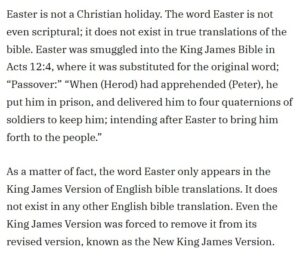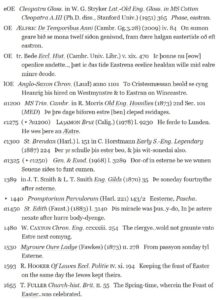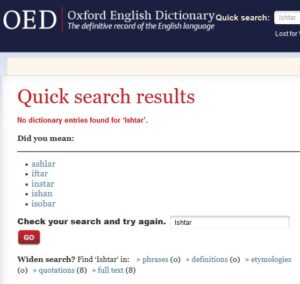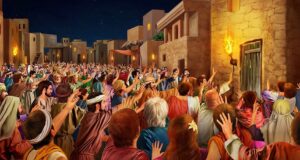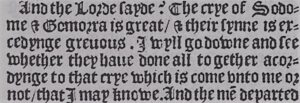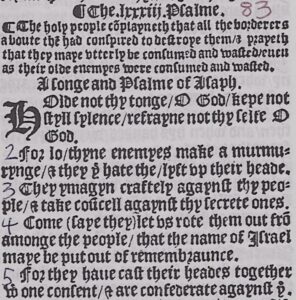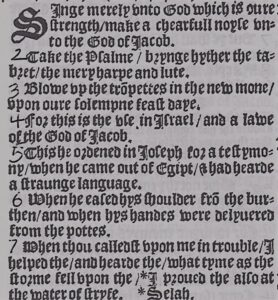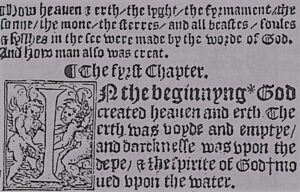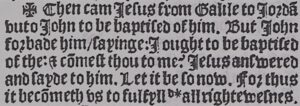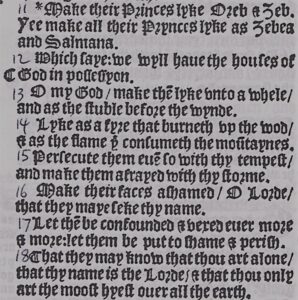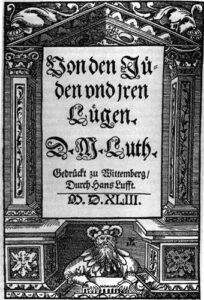It is wonderful to update the Old Testament of the 1537 Matthew Bible and see the meaning come alive. I am now (June 16, 2022) almost finished the book of Numbers. At the end of this article is my full update of chapter 20. But first, a short discussion of two interesting features of this chapter.
The first concerns how Tyndale used a variety of words to draw out shades of tone and meaning. An example is in the passage where Moses draws water from a rock in the desert. Below is Tyndale’s original translation:
1537 Matthew Bible, Numbers 20:7-11
7And the Lord spake unto Moses saying: 8take the staff, and gather thou and thy brother Aaron the congregation together, and say unto the rock before their eyes, that he give forth his water. And thou shalt bring them water out of the rock and shalt give the company drink, and their beasts also.
9And Moses took the staff from before the Lord, as he commanded him. 10And Moses and Aaron gathered the congregation together before the rock, and he said unto them: hear ye rebellious, must we fetch you water out of this rock? 11And Moses lifted up his hand with his staff and smote the rock two times, and the water came out abundantly, and the multitude drank, and their beasts also.
These verses contain words we no longer use in the same way that Tyndale used them. Especially, the expression ‘fetch out’ in verse 10 – “must we fetch you water out of this rock?” – is not quite right.
In modern use, according to the Oxford English Dictionary (OED), to fetch means to go in quest of something and to bring it back.[i] But Moses was not going anywhere to get something and bring it back. He was commanded to work a miracle right there, on the spot. What, then, was the meaning of ‘fetch out’ in this passage? The answer lies in a sense that the OED describes as “now rare”: to draw from or out of a source. In modern English, we would say ‘draw out.’ That this was the sense in Numbers 20 is confirmed in Strong’s Concordance, which gives the meaning of the Hebrew word as ‘bring out.’ But ‘bring’ is a general word, while ‘draw’ is the word we normally use in the context of obtaining water from a well or a spring (like ‘fetch’ was used in the past).
The KJV also had ‘fetch out’ in verse 10, as did the 1540 Great Bible. However, most modern Bibles, including the NIV and ESV, have ‘bring out.’ (In fact, this revision was introduced in the 1560 Geneva Bible, which was a revision of the Great Bible[ii].) The NIV reads,
NIV: He and Aaron gathered the assembly together in front of the rock and Moses said to them, “Listen, you rebels, must we bring you water out of this rock?”
Sarcasm: Draw water from a rock!
The NIV translation is clear, and I certainly cannot say that it is wrong. In verse 8 of Numbers 20, Tyndale (and the KJV) used ‘bring out’ to translate the same Hebrew word. But Tyndale did not use a different word in verse 10 for no reason. If we follow his lead and update ‘fetch’ to ‘draw,’ in my view it highlights the sarcasm of Moses’ outburst, and his unbelief: What, was he to draw water from a rock, as a person might draw water from a well?
Actually, Moses’ attitude is difficult to understand here, because he had already seen God perform such a miracle. In Exodus 17:6, Moses struck a rock and brought water forth from it. However, something about his mindset in this situation dishonoured the Lord and indicated unbelief, as we learn later in chapter 20. Hence his sarcasm.
I gently updated verse 10 in the New Matthew Bible as follows:
And Moses and Aaron gathered the congregation together before the rock, and he said to them, Hear, ye rebellious! Must we draw you water out of this rock?
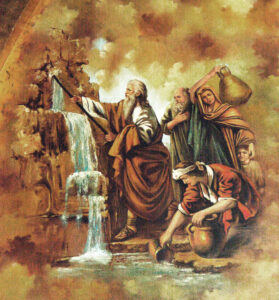
Many artists depict the rock Moses struck as very large, with a stream falling out into a pool that people drew water from.
The water of strife in Numbers 20
In Numbers 20 we see another wonderful feature of the Matthew Bible: how the meaning is given clearly in verses where later bibles lost meaning through unnecessary transliteration of the Hebrew.
An example of this is at verse 13. From Tyndale’s translation, we learn that the water from the rock that Moses struck (or perhaps the place itself) was called “the water of strife.” It was so called because the people of Israel strove with the Lord. The 1535 Coverdale Bible and the 1540 Great Bible also referred to “water of strife.” John Wycliffe’s bible, circa 1380-84, had “the waters of against-saying,” which is wonderfully descriptive.[iii] However, beginning with the Geneva version, this became instead “waters of Meribah,” a name that tells us nothing. The KJV followed the Geneva Bible here, as have most modern English versions.
Tyndale’s translation of Numbers 20:12-13, as I have updated the verses for the New Matthew Bible is below. Verse 12 informs us that Moses did not believe the Lord’s words about drawing water from a rock – even though, as mentioned, Moses had already seen the Lord perform this very same miracle:
12And the Lord said to Moses and Aaron, Because you did not believe me, to sanctify me in the eyes of the children of Israel, therefore you shall not bring this congregation into the land that I have given them.
13This is the water of strife, because the children of Israel strove with the Lord.
The water of strife is referred to again in this chapter, where the Lord speaks to Moses and Aaron about Aaron’s appointed death. Below are verses 23-26 as I have updated them:
… the Lord spoke to Moses and Aaron in Mount Hor, close by the border of the land of Edom, saying, Let Aaron be put unto his people. For he shall not come into the land that I have given to the children of Israel, because you disobeyed my mouth at the water of strife. Take Aaron and Eleazar his son, and bring them up into Mount Hor; and strip Aaron out of his vestments, and put them upon Eleazar his son. And let Aaron be put unto his people and die there.
For interest’s sake, below also is the Wycliffe translation of this passage (with updated spelling):
Wycliffe’s bible, Numbers 20:23-26: … the Lord spake to Moses and said, Aaron [shall go] to his peoples, for he shall not enter into the land which I had [promised] to the sons of Israel, for he was unbelieveful to my mouth at the waters of against-saying. Take thou Aaron, and his son with him, and thou shalt lead him to the hill of Hor; and when thou hast made naked the father of his cloth, thou shalt clothe with it Eleazar, his son, and Aaron shall be gathered [to his people], and shall die there.
How severe the law was! Moses was a wonderful servant of God, but at the water of strife he lost his faith and his temper. He disobeyed God by striking the rock in a display of unbelief and frustration, instead of simply telling it to give forth its water. And what a price he and Aaron must pay for that: neither of them would see the promised land. No wonder the apostle Paul described the law as “a yoke … that neither our fathers nor we were able to bear” (Acts 15:10).
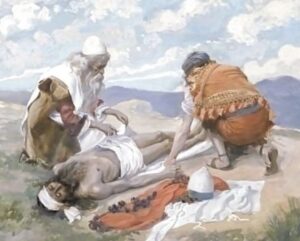
Aaron dies in Mount Hor, and his priestly office is transferred to his son Eleazar.
I hope later to write another blog post showing more examples of how the Matthew Bible avoided unnecessary transliteration, and how this made the scriptures come alive. But for now, following is my complete, gentle update of Numbers 20 for people who are interested.
Numbers 20: The complete chapter
This is the first draft of Numbers 20 for the New Matthew Bible. John Rogers’ chapter summary is also shown. Rogers added descriptive summaries at the beginning of every chapter in the Matthew Bible, as was the practice of the time:
Chapter 20 (draft)
Miriam dies. The people murmur. They have water even out of the rock. Edom denies the Israelites passage through his realm. The death of Aaron, to whose office Eleazar succeeds.
And the whole multitude of the children of Israel came into the desert of Zin in the first month, and the people dwelt at Kadesh. And there Miriam died, and was buried there. 2Moreover, there was no water for the multitude, because of which they gathered themselves together against Moses and Aaron. 3And the people fought with Moses and spoke, saying, Would God that we had perished when our brethren perished before the Lord! 4Why have you brought the congregation of the Lord into this wilderness, so that both we and our animals will die here? 5Why did you bring us out of Egypt, to bring us into this ungracious place, which is no place to sow seed, nor of figs nor vines nor of pomegranates, and neither is there any water to drink?
6And Moses and Aaron went from the congregation to the door of the tabernacle of witness and fell upon their faces. And the glory of the Lord appeared to them. 7And the Lord spoke to Moses, saying, 8Take the staff and gather the congregation together, you and your brother Aaron, and say to the rock, before their eyes, to give forth its water. And you will bring for them water out of the rock, and will give the company drink, and their beasts also.
9And Moses took the staff from before the Lord, as he commanded him. 10And Moses and Aaron gathered the congregation together before the rock, and he said to them, Hear, ye rebellious! Must we draw you water out of this rock? 11And Moses lifted up his hand with his staff and struck the rock two times, and the water came out abundantly. And the multitude drank, and their beasts also.
12And the Lord said to Moses and Aaron, Because you did not believe me, to sanctify mea in the eyes of the children of Israel, therefore you shall not bring this congregation into the land that I have given them.
13This is the water of strife, because the children of Israel strove with the Lord. And he was sanctified upon them.
14And Moses sent messengers from Kadesh to the king of Edom to say, Thus says your brother Israel: You know all the hardship that has happened to us – 15how our fathers went down into Egypt, and how we dwelt in Egypt a long time, and how the Egyptians dealt ill with both us and our fathers. 16Then we cried out to the Lord, and he heard our voices and sent an angel, and has brought us out of Egypt. And behold, we are in Kadesh, a city hard by the borders of your country. 17Let us go in good fellowship through your country. We will not go through the fields nor through the vineyards, neither will we drink of the water of the wells, but we will go by the highway, and neither turn to the right hand nor to the left until we are past your country.
18But Edom answered him, See that you come not by me, lest I come out against you with the sword.
19And the children of Israel said to him, We will go by the beaten way. And if either we or our livestock drink of your water, we will pay for it. We will do no more than pass through by foot only.
20But he said, You shall not go through.
And Edom came out against them with a mighty people and a strong hand. 21And thus Edom refused to give Israel passage through his country. And Israel turned away from him.
22And the children of Israel removed from Kadesh, and went to Mount Hor with all the congregation. 23And the Lord spoke to Moses and Aaron in Mount Hor, close by the border of the land of Edom, saying, 24Let Aaron be put unto his people. For he shall not come into the land that I have given to the children of Israel, because you disobeyed my mouth at the water of strife. 25Take Aaron and Eleazar his son, and bring them up into Mount Hor; 26and strip Aaron out of his vestments, and put them upon Eleazar his son. And let Aaron be put unto his people and die there.
27And Moses did as the Lord commanded. And they went up into Mount Hor in the sight of all the multitude. 28And Moses took off Aaron’s clothes and put them upon Eleazar his son, and Aaron died there at the top of the mount. 29And Moses and Eleazar came down out of the mount. And all the house of Israel mourned for Aaron thirty days. ~~~~~
Verse 12, note (a): To sanctify is here to show and declare to be holy, as in M’t 6:13.
~~~~~
Ruth Magnusson Davis, June 2022.
Note, for more of the NMB Old Testament, Genesis 1-25 is in downloadable pdf format here.
[i] See the online OED under ‘fetch,’ verb. This online resource is only accessible to subscribers, so I have not linked it. Apparently, the former meaning of ‘fetch out’ could indicate a greater degree of sarcasm than we can now appreciate; it was sometimes used to suggest that the thing to be drawn out was very remote.
[ii] The base of the Geneva Old Testament was the Great Bible, whereas the Geneva New Testament was a direct revision of William Tyndale’s work. For a history of the English bible, with a focus on revisions introduced in the Geneva and Revised versions, see Part 2 of The Story of the Matthew Bible. Many of the revisions were more significant than the items discussed here. Part 2 of The Story sets them out in black and white, with complete citations and references.
[iii] Or, “again-saying,” in the sense “gainsay,” which means to speak against (literally, to back-say).


